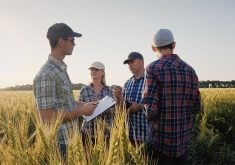As farming ventures grow, more of them operate as corporations.
Typically, farms start with sole proprietors or as spousal partnerships. This works for a small farm, but as profitability grows, incorporation is the next logical step.
Farms typically incorporate to take advantage of the low corporate tax rate on the first $500,000 of taxable income. In Alberta it is 11 percent. In Manitoba the rate is nine percent and in Saskatchewan it was temporarily nine percent but rose to 10 percent on July 1, 2023, and will rise to 11 percent on July 1, 2024.
Read Also

Invigor Gold variety viewed as threat to condiment mustard
Invigor Gold, the canola-quality mustard developed by BASF, is on a collision course with Canada’s condiment mustard industry. It’s difficult to see how the two can co-exist.
The low corporate tax rate allows for reinvestment in the corporation, especially to buy land or repay debt, which are non-deductible cash outlays.
The right time to incorporate is:
When personal taxable income is unmanageable. We call this “snowballing,” where farms defer income and pre-buy expenses just to avoid a large personal tax bill. This can be expensive because deferring grain ties up cash rather than earning interest on it or repaying debt.
It can also be risky because many farming operations have huge future tax liabilities. One mistake in not deferring some income or forgetting to buy inputs between Christmas and New Year’s can push farms into a very high tax bracket.
If something should happen to you, the potential tax bill could be catastrophic to the future of the farming operation. For example, with $500,000 of deferred grain, pre-buys and inventory at the top 48 percent tax bracket, this could be $240,000 in tax if you aren’t able to plant a crop in the next year to generate offsetting expenses.
Significant taxable income is anticipated. Even very small profitable farming operations can have significant taxable income when they wind down the farming operation. Incorporating before the final year of farming allows you to tax this income in the corporation.
Due to immediate expensing, many farmers have fully depreciated their assets for tax purposes. When the assets are sold, there is significant taxable income. Call your accountant before the auction. Often after the auction, the corporation becomes a “pension company” for the shareholders, paying out dividends in retirement when they are in lower personal tax brackets.
Significant land purchases. It is hard to generate personal after-tax funds to purchase more than a quarter or two of land personally at today’s prices. For example, at a 10 percent corporate tax rate, $100,000 of income in a corporation would generate $10,000 of tax, leaving $90,000 of after-tax funds to acquire land.
Personally, at a 40 percent tax rate on average, you would need $150,000 of income and pay $60,000 in tax to generate that same $90,000 of after-tax funds. This is why most new land purchases are done in corporations. We recommend planning land purchases with your accountant before personally buying a significant amount of land.
There are two ways to transfer a farming operation into a corporation:
Section 85 rollover. The existing farming assets held personally are rolled into the corporation on a tax deferred basis. The downside with this transaction is that deferred grain cannot be rolled into a corporation. As well, some farming operations have more liabilities than tax cost on assets, which can lead to taxable income on incorporation.
Partnership sale to a corporation. A spousal partnership that owns farming assets would typically be considered qualified farm property, which can be sold to a corporation using your tax-free capital gains exemption. The sale proceeds can then be withdrawn from the corporation in the future without paying personal tax on the drawings.
The downside is this requires farming in a partnership for at least two years, which may not be possible. Deferred grain cannot be rolled into a partnership when the partnership is set up.
As well, when using the capital gains exemption, prepaid alternative minimum tax may need to be paid, depending on your tax situation. This option requires more planning and professional fees but can generate huge personal tax savings.
Timing of the transaction
Shortly after Dec. 31 is typically the easiest time of year to incorporate a farm. The Dec. 31 personal tax return will be filed, and then the transfer to the corporation happens in the new year with a clean cutoff.
However, other times of the year may be necessary, depending on the timing of the personal income and expenses before incorporating.
Managing your taxable income right before incorporation is very important because deferred grain cannot be rolled into a corporation. This may require buying input inventory, deducting it personally and then rolling this inventory to the corporation.
Due to the income planning involved, it is best to make a plan to incorporate two years in advance of when it is necessary, especially before winding down the farming operation.
We recommend discussing incorporation with your accountant, especially if your personal taxable income is becoming unmanageable, you expect significant taxable income in the future or you are buying farmland.
Levi Derksen, CPA, CGA, is a senior manager in the Ag Team at Buckberger Baerg & Partners LLP in Saskatoon. You can contact him at: lderksen@bbllp.ca.















